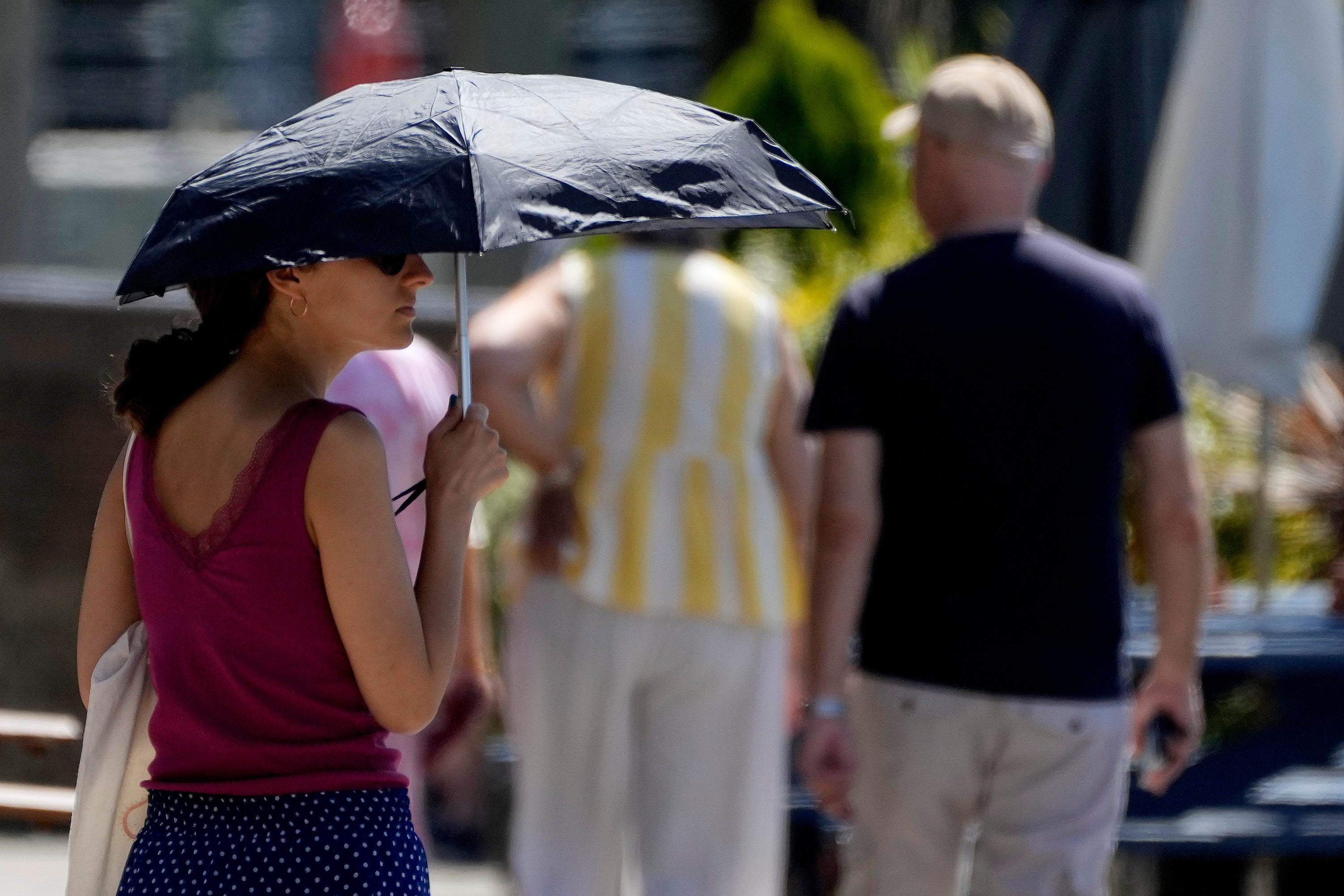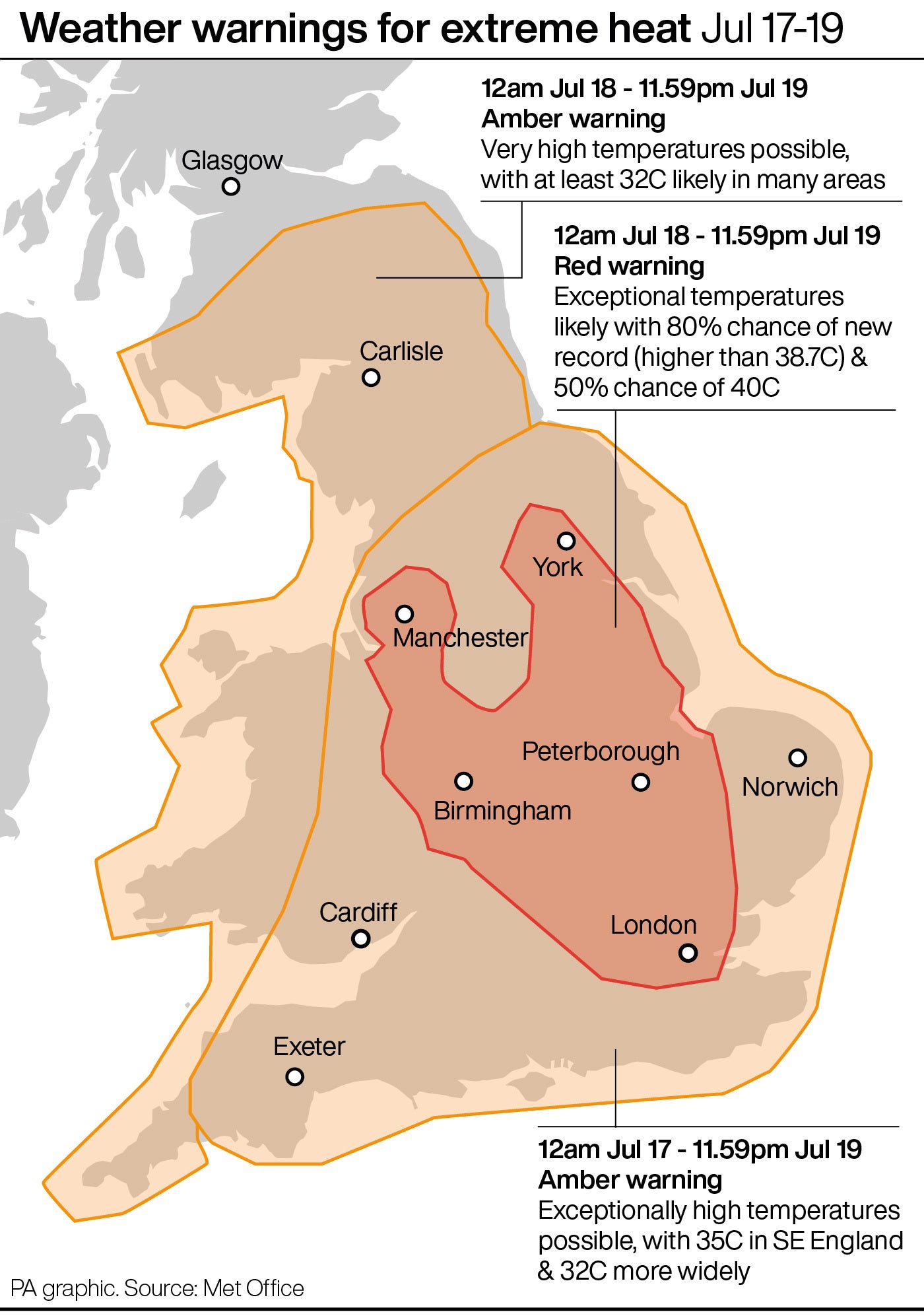Millions braced for record-breaking heat as ‘national emergency’ threatens disruption
Level four warning is in force across England for Monday and Tuesday

England is being put in the highest level national emergency measure for the first time because of hot weather, as predicted record temperatures are set to bring a risk of heat-related illness and death even among the fit and healthy.
Some schools will close during the potential 40C heat as health leaders said pressure on the NHS would be “extreme” with severe bed shortages, while passengers on many rail routes are being urged not to travel.
With forecasters giving an 80 per cent chance that the UK’s 38.7C record temperature will be topped on Monday or Tuesday, the UK Health Security Agency (UKHSA) is putting in place a level four heat-health alert.
At level four – a “national emergency” – UKHSA warns “illness and death may occur among the fit and healthy, and not just in high‑risk groups and will require a multi‑sector response at national and regional levels”. Risks flagged under the warning level include melting roads and buckling railways. The level four warning, which covers the whole of England, will be in place for all of Monday and Tuesday, UKSHA said.
Dr Nikos Christidis, a climate attribution scientist at the Met Office, said: “We hoped we wouldn’t get to this situation but for the first time ever we are forecasting greater than 40C in the UK.”
He added: “Climate change has already influenced the likelihood of temperature extremes in the UK. The chances of seeing 40C days in the UK could be as much as 10 times more likely in the current climate than under a natural climate unaffected by human influence.”
It comes as the Met Office separately announced its first “red warning” for extreme heat – meaning it is “very likely that there will be a risk to life” – covering large swathes of England including London, Birmingham and Manchester.

The Met Office says there is a 50 per cent chance that the mercury could reach 40C in England on Monday or Tuesday. The current UK record was set at Cambridge Botanic Garden on 25 July 2019.
Cabinet Office minister Kit Malthouse chaired a Cobra emergency committee meeting on Thursday to discuss the heatwave and will hold a further ministerial Cobra on Saturday.
Downing Street said officials would continue to meet over the weekend and that “the prime minister is kept up to date with all the latest information”.
Labour has accused ministers of being “asleep at the wheel”, calling for guidance on “safe indoor working temperatures”.
Deputy leader Angela Rayner said: “Ministers have gone missing in action when we need a real plan properly communicated on the delivery of essential services and how people will be kept safe.”
As the country braces for the heatwave, some schools will close on Monday and Tuesday. Alan Roe, headteacher of Dr Challoner’s High School, in Buckinghamshire, wrote to parents on Friday saying that “due to the worsening weather forecast and the red weather alert (which was amber this morning), we have decided to close the school on Monday and Tuesday on health and safety grounds”.
Cover work and activities will be set by teachers for both days, Mr Roe added, but there will be no livestreamed lessons.
In Hampshire, the Costello School has written to parents to inform them that after “the extreme temperatures forecast for Monday and Tuesday next week we have taken the difficult decision to close the school on these days”. Altwood Church of England School in Maidenhead announced that it would be closing on Monday and Tuesday because of the "extreme heat", as did Three Rivers Academy in Surrey.
A Department for Education spokesperson said “school leaders are responsible for managing their own local circumstances, but we are not advising schools to close”. They added: “There is clear government guidance available online to help school staff look after children in the hot weather, including the use of ventilation, keeping children hydrated, and avoiding vigorous physical activity for pupils.”

The UKHSA’s level four alert is being issued for the first time since the “Heatwave Plan for England” was introduced in 2004. In a section detailing the anticipated risks and responses during a level 4 heatwave, the document states: “Road surfaces are susceptible to melting under extreme or prolonged temperatures; however, as the surface temperature may not be dependent on the air temperature, melting is more likely to be as a result of direct sunlight.”
It adds: “The rail network will be susceptible to rails warping or buckling under extreme or prolonged temperatures and this will vary according to specific local factors including local geography and the maintenance status of the track.”
Separately, Network Rail has warned train passengers to only travel if necessary, with speed restrictions set to be introduced on railway lines. Jake Kelly, Network Rail’s system operator group director, said: “Rail passengers in England and Wales should only travel if necessary on Monday and Tuesday as there will be delays and cancellations to train services due to the unprecedented heat we’re expecting.”
Matthew Taylor, chief executive of the NHS Confederation, said: “With temperatures soaring, and a level four heat warning being called for the first time ever, the pressure on the NHS will be extreme over the coming days with severe bed shortages, ambulance services severely stretched and several health systems around the country having to declare critical incidents.
“The Met Office has declared a red alert for early next week and the NHS will be working very closely with other public services including local government and the police, to do all it can to prepare for a surge in demand for heat-related admissions.”
Met Office chief meteorologist Paul Gundersen said: “Exceptional, perhaps record-breaking temperatures are likely early next week, quite widely across the red warning area on Monday, and focused a little more east and north on Tuesday. Currently there is a 50 per cent chance we could see temperatures top 40C and 80 per cent we will see a new maximum temperature reached.
“Nights are also likely to be exceptionally warm, especially in urban areas. This is likely to lead to widespread impacts on people and infrastructure. Therefore, it is important people plan for the heat and consider changing their routines. This level of heat can have adverse health effects.”
While England will see the hottest temperatures, other parts of the UK face potentially record-breaking temperatures. Steven Keates, a Met Office meteorologist, told The Independent: “For Wales, I would say the hottest day, probably for the bulk of Wales… will be Monday. I would think 35[C] is possible, which will be very close to the Welsh all-time record of 35.2 [C] so that record is under threat.
“For Northern Ireland, I think the hottest day will be Monday… 30[C] I’d say for Northern Ireland, they’re not quite getting the extreme heat but still… hot enough, to be fair.
“And then, for Scotland, probably the hottest weather will be Tuesday, particularly in the south of the country where 32, 33[C] is possible so that will challenge the all-time Scotland record as well – so that’s 32.9[C].”
The weather has hit sports events, with five horse racing meetings called off on Monday and Tuesday.
A government spokesperson said: "Ministers and officials are working right across government alongside the devolved administrations, as well as our partners, to assess and mitigate the impact of the heatwave, and we are already taking all the necessary steps to protect the public. Effective contingency measures will be immediately stood up if and when needed, whether it be to support the NHS or rail services.
"We would urge everyone to continue to take precautions to ensure they are able to stay cool as well as support vulnerable family, friends and neighbours who may find it more difficult to cope.”






Join our commenting forum
Join thought-provoking conversations, follow other Independent readers and see their replies
Comments